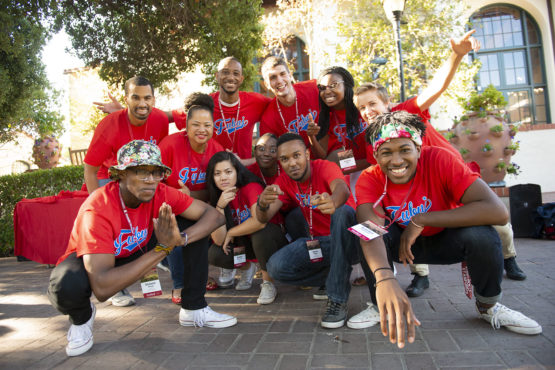Stanford receives gift to support the university’s Black Community Services Center and Ujamaa student residence
A gift from Stanford alumnus Evan Spiegel will expand programs and create a permanent source of funding.
A generous gift from alumnus Evan Spiegel, ’12, and his family will create a permanent source of funding for the Black Community Services Center and Ujamaa House. This investment enables significant expansion of the educational, leadership and cultural programs provided by the BCSC and Ujamaa, and will empower students to play a central role in utilizing these resources. In addition, the gift will endow the resident fellow position and name the Jan Barker-Alexander Resident Fellow in Ujamaa, in honor of her remarkable impact as the longtime Ujamaa resident fellow.

The staff of Ujamaa poses with resident fellow Jan Barker-Alexander during the fall 2014 move-in day. Barker-Alexander is 2nd from left in middle. (Image credit: L.A. Cicero)
President Marc Tessier-Lavigne commented on the significance of the gift. “As we strive to combat anti-Black racism in our community and in our country, this generous gift is a testament to the profound impact of the Black Community Services Center and Ujamaa learning communities at Stanford,” he said.
“Stanford is advancing a number of initiatives centered around diversity, equity, inclusion and racial justice, including IDEAL, which is part of our Long-Range Vision. We are grateful to Evan and his family for supporting our work in this arena, and we know that this gift will have an immediate and positive effect on our students,” he said.
Evan Spiegel, ’12, is the co-founder and CEO of Snap, Inc. He developed Snapchat as a project for one of his product design classes at Stanford. During his junior year, he worked and studied in South Africa through the Bing Overseas Studies Program, where he met Bishop Desmond Tutu and witnessed the devastation of apartheid, the legacy of racism, and tireless efforts towards progress and reconciliation. Inspired by these experiences, Spiegel spent his senior year living in Ujamaa, a learning community that focuses on the histories, issues and cultures of the Black Diaspora.
“Our family is grateful for the opportunity to support Ujamaa and the BCSC,” he said. “I have fond memories of building Snapchat while living in Ujamaa. The friendships I made and experiences I had in Ujamaa helped shape who I am today. Even amidst the tremendous privilege at Stanford, there was plenty to learn about the everyday injustices of racism in our society.”
Together with Snap co-founder Bobby Murphy, ’10, Spiegel created the Snap Foundation, which develops pathways to the creative economy for underrepresented youth in Los Angeles. Through the Spiegel Family Fund, Spiegel also supports multiple organizations contributing to human progress through dedication to human rights, housing, education and the arts.
Jan Barker-Alexander, who was the Ujamaa resident fellow during Spiegel’s senior year, had a significant impact on the Stanford experience for him, as well as legions of other students.
“I am thrilled that we are able to honor Jan Barker-Alexander for her leadership and countless contributions to the Stanford community,” Spiegel said. “I have been incredibly inspired by the creativity and aspirations of Stanford students and hope that this gift will help them advance efforts to create the change our society needs.”
Barker-Alexander was the associate dean of students and director of the Black Community Services Center for nearly 18 years. Her transformational leadership includes working with an alumni leadership team and the Stanford National Black Alumni Association to raise funds to complete the renovation of the original craftsman building and expansion of a 3,000-square-foot deck and a 2,500-square-foot room used for lectures, classes, events and alumni visits.
“The BCSC and Ujamaa are spaces that provide a gateway to intellectual discovery by exposing students to what their K-12 experience never offered,” said Barker-Alexander. “The learning that takes place in these spaces, outside of the classroom, helps to build our diverse and powerful community.”
Barker-Alexander is currently assistant vice provost of Student Affairs for the Centers for Equity, Community and Leadership (ECL). In this role, she oversees each of the seven community centers at Stanford: Asian American Activities Center, Black Community Services Center, El Centro Chicano y Latino, The Markaz: Resource Center, Native American Cultural Center, Queer Student Resources and the Women’s Community Center. She also oversees the First-Gen and/or Low Income Office, and the Office for Military-Affiliated Communities. She joined the resident fellow cohort in 2006.
“I am humbled and thankful for this gift in support of Ujamaa and the BCSC,” said Barker-Alexander. “The work that I’ve done here over the years has been built on a legacy of activism and scholarship with a focus on Black liberation, which benefits humanity. I’ve been fortunate to be able to curate experiences for students where they can see themselves in the world, where they are not on the margins, and where they are the leaders making a more just and equitable world.
“This gift illustrates the power of the BCSC and Ujamaa communities to inspire and transform lives,” she said.
The Black Community Services Center
The BCSC engages students across five pillars: academic/intellectual, leadership development, mental health and well-being, alumni engagement and community building.
“The Black Community Services Center is beyond grateful for the generous gift from the Spiegel family,” said BCSC Director Rosalind Conerly. “The labor of supporting students who are Black, Indigenous and People of Color is critical. Community centers, also called cultural centers on some campuses, play a vital role in helping students through various challenges, affirming and assisting with their racial identity development as well as highlighting the cultural capital our students bring to campus. We are excited for the impact of this gift to lift up our efforts.”
Conerly said specific plans for the gift will be developed with the help of students, however, top priorities include expanding the Ernest Houston Johnson Scholars program and developing a “changemakers series,” in collaboration with Ujamaa, that would feature alumni from various walks of life.
“Because of the value of connection across various communities, we’re hoping to also use this gift to create other engagement opportunities between our center and the larger Stanford student population,” Conerly said.
Current BCSC initiatives include, but are not limited to, individual advising and leadership development, a two-quarter Scholar program for first-year students, the Annual Academic & Community Awards Ceremony and the annual Black Graduation Celebration, which celebrated 45 years in June. The center also provides advising and training for over 30 Black student organizations and promotes community service and various cultural and educational programs.
Ujamaa House
Ujamaa House was first established in 1970 as a floor for Black first-year students in Cedro dorm. After a few moves, Ujamaa settled in its current residence in 1976 and remains a gravitational center for Stanford’s Black community. The name “Ujamaa” comes from the Swahili word for “extended family.”
The house prides itself on fostering a sense of belonging for all residents by creating an environment for open, honest and challenging dialogue. About 50 percent of its residents are Black and the other 50 percent belong to other racial and ethnic backgrounds. Weekly programming helps residents and members of the broader Stanford community engage intellectually with real-world issues.
In addition to funding the resident fellow position, the gift would establish a residential programming and education fund, providing a significant increase in financial support. This may include enhancing the Ujamaa Scholars program, which features weekly presentations by upperclassmen residents focused on the Black Diaspora. Barker-Alexander would also like to expand experiential learning trips that expose students to the true history and experiences of Black people.
“I look forward to working with students to create spaces for learning, growing and building,” said Barker-Alexander.

